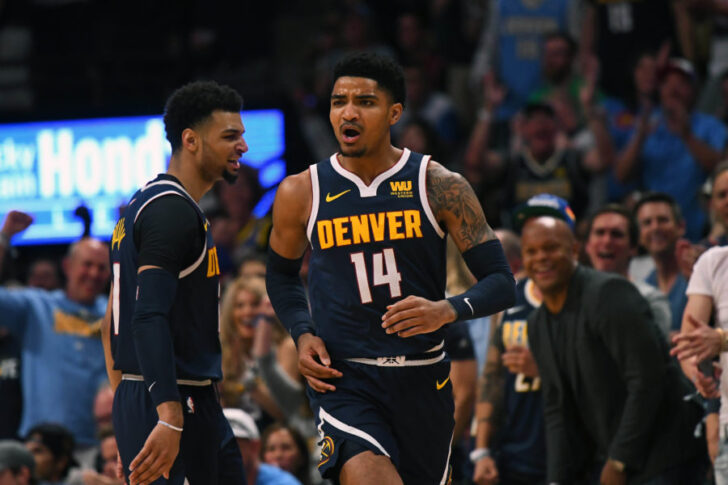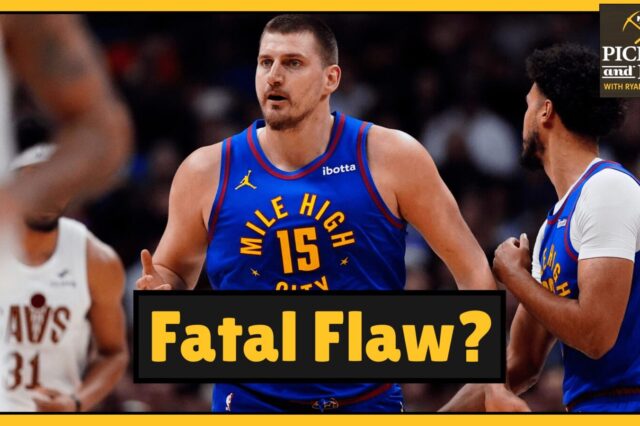It was an up-and-down year for the Denver Nuggets longest tenured player, but his play to close the season certainly left you excited for what is in store for Gary Harris.
Harris’ regular season was riddled with injures. Harris was forced to miss 25 games with a number of lower body injuries. At one point in the season it was a hamstring strain that hampered him until a groin injury and then right adductor strain popped up as the season went on.
Because of Harris’ array of injuries, he finished the regular season averaging just 12.9 points and 2.8 rebounds per game. Harris’ points per game total was down considerably from the year before (17.5), but the number of games he missed certainly had an effect on his rhythm and role offensively.
The playoffs are where Harris really made his mark. He played in all 14 games and averaged 14.2 points, 4.1 rebounds, and 2.3 assists per contest. Harris looked much healthier in the postseason and his play benefited because of it. He was a big reason the Nuggets were within one game of the Western Conference Finals.
Let’s take a closer look into what Harris did well this year, what he could to improve upon moving forward, and an overall impression of his 2018-19 season.
Ways Gary Harris grew as a player
A common trend in Harris first four seasons in the NBA is that he always found a way to get better year after year. Even though he was injured a lot last season, Harris still found a way to improve in multiple facets and his growth was showcased in the postseason.
Defense, defense, and defense; especially in the postseason
The Nuggets lost in the second round of the Western Conference Finals to the Portland Trail Blazers in seven games. In those seven games, Harris was often tasked with guarding either Damain Lillard and CJ McCollum. He did a strong job on both whenever he was the primary defender.
In the Nuggets series, Lillard averaged just 25.1 points per game, which was eight points under (33) what he scored in Portland’s first round series against Oklahoma City. Harris helped force Lillard to take tough shots all series long which forced McCollum to become the Trail Blazers primary scorer.
Harris averaged 1.4 steals per game in the Portland series, which included two games of at least three takeaways. It was not just in the Trail Blazers series that Harris made his mark defensively. He did the same thing against the San Antonio Spurs in the Nuggets first round series of the playoffs.
Derrick White — who is a former Colorado Buffaloes star and is now the Spurs starting point guard — opened the series with games of 16, 17, and 36 points. From that point on, the Nuggets stopped using Jamal Murray as the primary defender on White by switching Harris onto him defensively.
After Game 3, White scored a total of just 37 points the remainder of the series. Harris just absolutely shut him down offensively. The Nuggets success in that series was largely because of the defensive intensity that Harris played with. He really set a tone that allowed Denver to advance to the next round.
Continued growth as a playmaker
It has been well documented how well Harris works off Nikola Jokic. The two have tremendous chemistry on the floor. The frequent back door cuts from Harris that end in easy layups is evidence in that, but this year Harris took an even bigger step froward in his development as a primary ball handler.
One of the more underrated parts of the Nuggets roster is how interchangeable everyone truly is. Not only can Jamal Murray play point guard, but he is also a lethal shooting guard, which is the position he spent the most time playing during his time at Kentucky. When Murray is playing off ball, it allows Harris to be the primary ball handler, which is a role he has began to grow within.
While Harris’ assist numbers did not skyrocket by any means, it was clear watching him throughout the season that he was making better reads as a facilitator and that his court awareness had improved.
Even though Murray is still the Nuggets point guard of the future, next season could truly be the year we start to see Harris handle a little more of the primary ball handling duties. With that allowing Murray to play more off ball and tap into his scoring ability, this could be something that could take the Nuggets offense to even greater heights next season.
Ways Gary Harris can improve
For a player that has shown so much improvement during his time in the NBA, this past season what a bit of a step back for Harris. It did not have much to do with his play, but more with his availability to play.
Even though Harris was still productive when he was playing, It was still clear that Harris was far from the best version of himself. With that in mind, let’s take a dive into what Harris could look to improve upon heading into next season.
Find a way to play at least 75 games next season
As Harris missed games throughout the season, it left the Nuggets with the challenge of replacing one of their best and most consistent players. Malik Beasley had a tremendous season last year, but his services are better used off the bench. The same can be said for Torrey Craig and Monte Morris as well.
Harris played more than 70 games only once in his five-year career. He played 55 games in his rookie season, a career-best 76 games in his sophomore campaign, 57 games the following year, 67 games in his fourth season, and just 57 games this past year.
Harris cannot help the Nuggets if he is hurt and not on the court. It might just be a case of bad luck as Harris continues to get injured year after year, but Denver has to find a way to get Harris on the court more frequently.
No matter what the issue is, the Nuggets and Harris need to find a way to keep the the ever-steady Harris on the floor more consistently. He just signed a four-year extension back in 2017, so he is with the Nuggets for the long-haul. Now they just need him to be on the floor more often than not.
Find his three-point shot that was so productive just a couple seasons ago
One aspect of Harris’ game that did struggle this past year was his three-point shooting. His percentage took a considerable dip from just a few years ago — just over eight percent.
Back in 2016-17 — when Harris played 57 games — he shot a career-high 42 percent from three-point range and made 107 of the 255 shots he attempted. Just last year, Harris shot 39.6 percent from three and made a career high 156 triples. This past season though, Harris shot the second lowest percentage of his career –33.9 percent — and made just 82 of the 242 threes he attempted.
In the playoffs, Harris bumped his percentage up to 35 percent from three, but that is still considerably lower from what he is capable of. An explanation as to why that happened could be the number of leg injuries Harris dealt with this past season, which also goes hand in hand with his offensive rhythm being thrown off.
Final Grade
B
Harris is still getting a pretty good grade for his play last season and here is why. Even though he missed a ton of time, Harris still found a way to be productive when he was on the floor. Also, his performance in the playoffs might have won the Nuggets their first round series against San Antonio and it played a huge part in them just missing out on the Western Conference Finals.
When he was on the floor, Harris was arguably the best defensive player out there and he still found a way to have a positive impact offensively. As the Nuggets longest tenured player, Harris turned in a good — not great — 2018-19 season and could be in store for another breakout next year.



